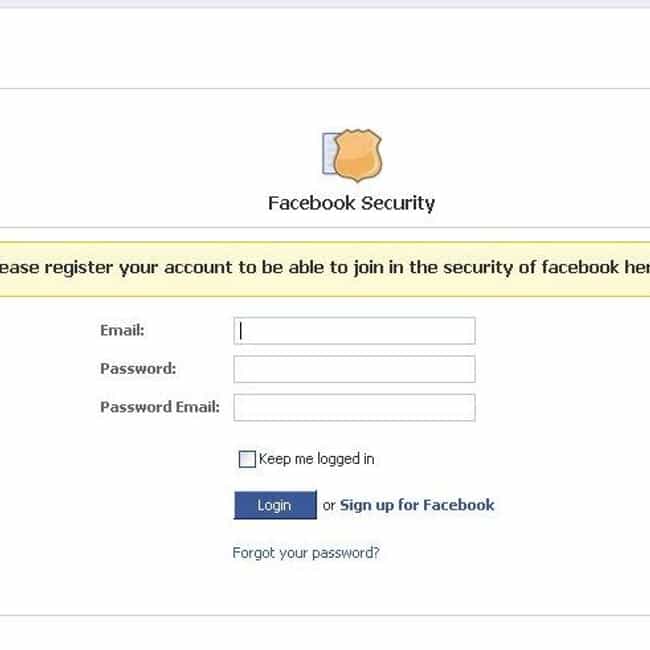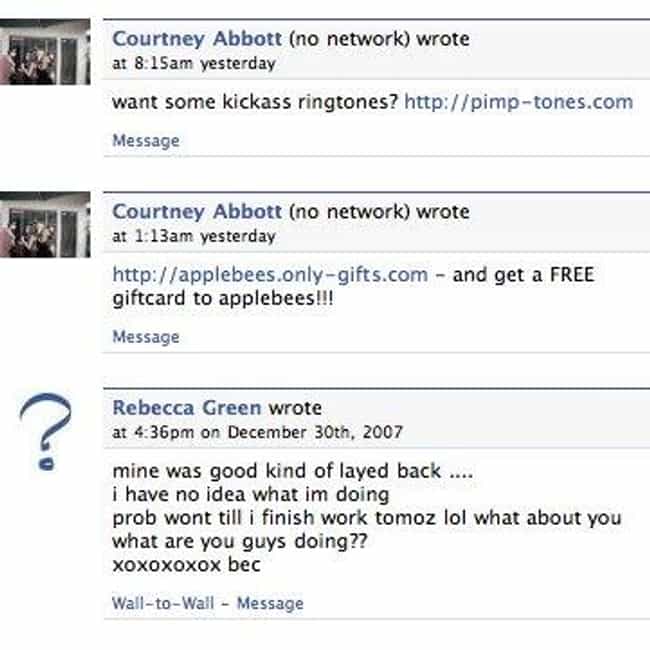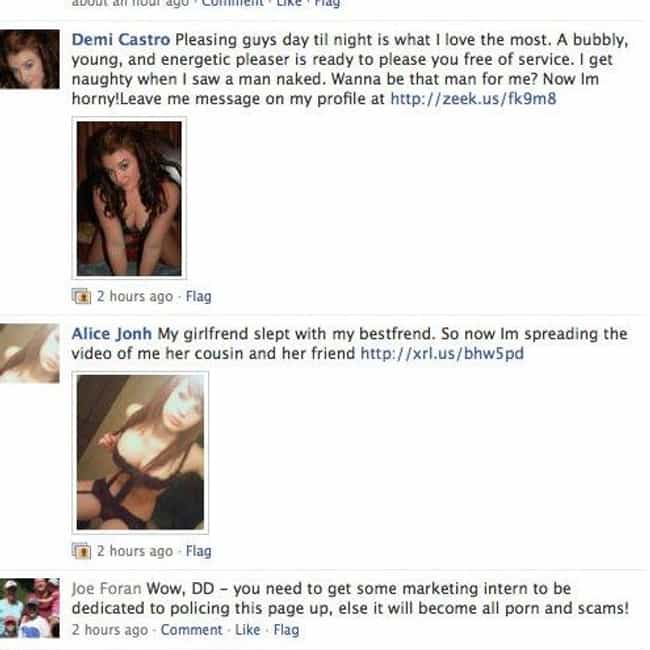The types of Facebook spam range from those which are just annoying to others that can steal and sell your personal information, post on your behalf and install malware on your computer. With spam and Facebook both big businesses, it's getting harder and harder to identify spam sometimes but these are the most common types of Facebook spam out there.
On the more not-malicious-but-really-annoying side of Facebook spam, work at home scams, male enhancement ads and unwelcome wall posts from those looking to promote a business, band or funny page are one of the most common types of Facebook spam. They don't necessarily hurt you, unless of course you willingly give them money, which is how they make a living. Tip: Don't give them money.
Similar to the nasty types of Twitter spam, at the opposite end of the spectrum, more dangerous Facebook spam types are those which can steal your personal information, which is then sold for top dollar, take over your account and post spam all over the social networking site without your knowledge or even hijack your computer with malware, compromising saved files which contain the really juicy personal details like credit card numbers and email passwords. These hide as scandalous videos of celebrities doing the nasty, in phishing sites or as proclaimed awesome new features like turning Facebook black. They all seem exciting and things you'd want on Facebook but more often than not they fail to deliver even after you give them access to your account.
To stay safe on Facebook, remember to check URLs before entering any login information, be weary of intent when clicking or downloading anything and always check things out before offering up any money. Just like with email spam, if something looks like it's too good to be true, it likely is.
On the more not-malicious-but-really-annoying side of Facebook spam, work at home scams, male enhancement ads and unwelcome wall posts from those looking to promote a business, band or funny page are one of the most common types of Facebook spam. They don't necessarily hurt you, unless of course you willingly give them money, which is how they make a living. Tip: Don't give them money.
Similar to the nasty types of Twitter spam, at the opposite end of the spectrum, more dangerous Facebook spam types are those which can steal your personal information, which is then sold for top dollar, take over your account and post spam all over the social networking site without your knowledge or even hijack your computer with malware, compromising saved files which contain the really juicy personal details like credit card numbers and email passwords. These hide as scandalous videos of celebrities doing the nasty, in phishing sites or as proclaimed awesome new features like turning Facebook black. They all seem exciting and things you'd want on Facebook but more often than not they fail to deliver even after you give them access to your account.
To stay safe on Facebook, remember to check URLs before entering any login information, be weary of intent when clicking or downloading anything and always check things out before offering up any money. Just like with email spam, if something looks like it's too good to be true, it likely is.

1
Facebook Feature Spam
Change Facebook to pink! Get a dislike button! See who has been viewing your profile! These things all sound like fun new features of Facebook but sadly they are nothing more than spam. While often these apps will do exactly what they claim, making you the cool kid on the block with the Facebook black, but they also hijack your personal information, and that of your friends, which is often sold to the highest bidder for big money.

2
Facebook Phishing Scams
Using a website interface that looks identical to Facebook's, these phishing scams ask you to willingly enter your Facebook login information on their fraudulent site. Once they get your details, all bets are off. You profile will be hacked, your account will start sending out posts and private messages spamming your friends and you can lose all access to your account all together. When in doubt, check the URL before entering your username or password anywhere. If it looks fishy, it probably is.

3
Facebook Wall Spam
Though generally not malicious, armchair marketers often advertise their pages, profiles and businesses by posting links on random pages. The hope is that by posting on a large brand page, a large group of people will see their hot new thing, brand or funny page and give it a like. In most cases, these posts are just reported as spam and swiftly removed.

4
Facebook Porn Spam
Featuring a seemingly amazing statement, a link to an external site and a naughty photo of video, porn spam on Facebook is some of the dirtiest. This type of spam preys on celebrities quite often claiming to offer stars like Rihanna, Katy Perry or Britney Spears doing very raunchy things in the bedroom. Much to the displeasure of the viewers, clicking these links does not take you to celebrity sex tapes, but can hijack your account and begin posting similar messages on other posts and pages.

5
Facebook Opportunity Spam
Everyone is looking for a work at home job or quick way to make money these days but Facebook is certainly not a place to find such a thing. Posts and comments claiming that one can inbox them to learn how to make hundreds daily just by sending in $39 to start are nothing more than pyramid scams. Any job that requires you to pay money isn't a job, it's a scam. Long story short: If it looks too good to be true, it likely is.

6
Facebook Video Spam
Also common on Twitter, these scams come in from your friends as private messages claiming that you're featured in some scandalous or saucy video. You click the link to watch the video and are instructed to update a utility, such as your Flash player. Instead of enhancing your computer, what you're downloading is actual malware which can then take over your Facebook profile, steal your personal information and even harm your computer. Be safe when you receive such messages by checking with your friends to make sure they actually sent the message before clicking or downloading anything.

7
Facebook Friend Spam
We all receive random friend requests once in a while, either from people in your area, those with common interests or spammers. After adding malicious new friends, it's common that you may then receive wall post or private message spam or scam comments, even Nigerian 419 scam notes or those from seemingly hot women looking to start a relationship before conning you into giving them money. Sorry to burst your bubble, these people don't want your friendship, they want your cash.

8
Facebook Private Message Spam
Similar to friend spam and video spam, this type of Facebook spam features private messages sent from your friends. You already trust that person, well trust them enough to be Facebook friends, making you more likely to read and click on any message they send. Messages range from simple advertisements for products to dangerous and malicious scams that can take over your computer. If it looks out of place, it likely is. Check with your friend before opening anything that seems odd. They might have been hacked and you could be next.
0 comments:
Post a Comment